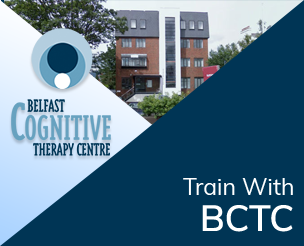At BCTC, we have been training over forty therapists each year for eighteen years. No matter how hard they have worked to learn theory and skills, and no matter how proficient they are as beginners, they routinely report feelings of low self-confidence on first going into GP practices as trainee Cognitive Behavioural Psychotherapists.
They fear that, as trainees, they are not skilled or competent enough to be able to work effectively with clients.
Their clients and referrers (invariably GPs) have completed user satisfaction questionnaires (which rate trainee rates on outcome). Over the past eighteen years the scores reported by both clients and GPs, out of a possible 0-10 have ranged from 6-10. Most are 8 or above, even from clients who have been seen by trainees for only 4-6 weeks due to a need for onward referral following competency difficulties.
Dr James Hawkins, who is an Edinburgh-based medical doctor and therapist, gave a very interesting talk to the Psychologists Protection Society in 2016, based around the subject of therapist efficacy.
Professor Glenn Waller had proposed that if therapists allow their theory and skills to become rusty the result will be a reduction in efficacy. Likewise, a meta-analysis on doctors suggested the same, with a corresponding increase in death rates.
In CBT, adherence to protocols and therapist competence depend very much on the alliance and with a poor alliance they’re not really relevant. In a meta-analysis of eight other differing therapies, evidence suggested that treatment fidelity was unrelated to treatment outcome. So adherence and competence appear to be unrelated.
Does this apply to therapists? Large (if somewhat old) meta-analyses provide no evidence for a relationship between experience and outcome. We may not be getting worse but we’re not getting better either.
Experience – little relationship to outcome. Likewise qualifications / theoretical orientation? No.
In his talk, James referred to adherence and competence depending very much on the alliance.
What is the Alliance?
- Personal qualities such as empathy, honesty and ability to inspire hope and trust
- Therapist awareness of the client’s goals for therapy
- The skills with which to enable clients to reach their goals
In our experience, all three are critical to effective outcome. We have seen many graduates of the training programme leave after two years of training, equipped with a skill set foundation on which they need to be able to build.
After a year working in organisations where they are employed to provide only sub optimal dosages of CBT – often 6-8 weeks – some return and seek work at our Centre. Their skill with critically important tools such as case formulation have deteriorated. Many have seen up to six clients daily, knowing that, due to lengthy waiting lists they must end treatment before the client is ready. From leaving the Centre with hope and a desire to learn, many graduates become disheartened. Sadly, without an agreement to undertake skills revision, we cannot re-employ them.
Trainees are up-to-date with the most recent concepts in theory and practice. They simply need experience and good supervision. In most cases their empathy and desire to help are undoubted. They therefore possess the basics of a good – and growing – alliance.
Where does this leave those who have graduated but who have had to work in an under-resourced failing system?


